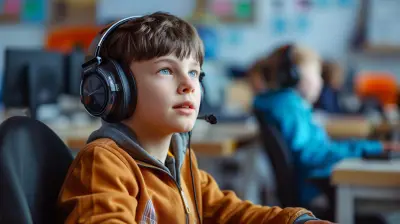Motivating Students to Become Lifelong Learners
29 October 2025
Let’s face it—“lifelong learning” sounds like a buzzword some overzealous educator came up with while sipping pumpkin spice lattes. But behind the fancy phrase is a golden idea: helping students not only survive Algebra II, but actually enjoy learning for, well... their whole life.
Whoa. That’s a tall order.
But don’t panic! We’re not sending students on some Everest-level academic journey here. Instead, this is about sparking curiosity, building habits, and nurturing the kind of open-mindedness that can stand the test of time (and TikTok trends). Whether you’re a teacher, parent, or someone secretly stalking this blog for wise tips—you’re in the right place.
Ready to turn students into learning ninjas? Buckle up!
What Does “Lifelong Learning” Even Mean?
Before we try to motivate anyone, let’s clear up what we’re actually motivating them for.Lifelong learning is the idea that learning doesn't stop after school. It’s not just about getting good grades or passing tests. It’s about staying curious, asking “why,” and enjoying the ride of discovering new things till we’re old enough to start forgetting them.
Think of it like this: knowledge isn’t just for school. It’s like guacamole—best shared, always fresh, and way too good to be limited to Taco Tuesdays.
Why Should Students Care About Lifelong Learning?
Great question, imaginary-but-incredibly-wise reader.Here’s the deal—most students don't wake up saying, “Today, I will cultivate a growth mindset and work proactively toward my personal development.”
(If someone does, please tell us their location immediately so we can make them president.)
Students are more likely to say: “Why do I need to know this?” or “Will this be on the test?”
So if we want them to care about lifelong learning, we’ve gotta make it real. Tangible. Meaningful. Something they can connect to their lives right now—not just their future résumés.
Here’s what’s in it for them:
- Better problem-solving skills: Life throws curveballs. Might as well know how to catch ‘em.
- Career adaptability: Jobs evolve. Robots might take over. Lifelong learners adapt.
- Confidence: Knowing how to learn is basically a superpower.
- Personal growth: Because “well-adjusted adult” looks good on everyone.
And yeah, it also helps them win arguments using facts. Just saying.
Creating a Culture of Curiosity
If we want students to become lifelong learners, we need to make learning feel less like a chore and more like an adventure. Because let’s be honest—no one is motivated by endless worksheets and monotone lectures.Instead, let’s build a culture where curiosity isn’t just encouraged—it’s contagious.
1. Ask More Questions Than You Answer
Nothing makes a student feel more engaged than a question that makes them pause and think, “Wait, WHAT?”Whether it’s:
- “What do you think happens if we stop sleeping?”
- “Why do zebras have stripes?”
- “If AI runs the world one day, what’s left for humans?”
Boom. That’s the spark we’re looking for. Curiosity is like a match—strike it right, and you’ve got a fire.
2. Embrace the “I Don’t Know” Moments
Let’s normalize not having all the answers. Seriously. Half the time when adults say “I know,” we’re bluffing with Google open in another tab.Saying “I don’t know—let’s find out together” not only builds trust, it models the very skill we want students to develop: figuring stuff out.
Making Learning Personal (Because One Size Doesn’t Fit All)
We don’t wear each other’s shoes (unless it's a sibling thing and even then, it's a bloodbath). So why force everyone to learn the same way?3. Let Them Follow Their Interests
If a student is obsessed with Minecraft, get them to write a persuasive essay on why creepers deserve their own sitcom. If they love cooking, sneak in a science lesson while baking cookies. (Spoiler alert: baking = delicious chemistry.)Personalized learning isn’t coddling—it's fueling a fire that’s already burning.
4. Offer Choices
Humans love control. You do. I do. Students DO. Giving them options in how they show their learning (video, essay, comic strip, interpretive dance?) makes them feel involved—and when we feel involved, we care more. Wild concept, huh?The Power of Growth Mindset (And Other Brainy Magic)
Cue the dramatic music—the growth mindset is here to save the day!5. Teach That Smart Isn’t Fixed
Some students think they’re either a “math person” or they’re not. That’s like saying you’re either “a breathing person” or “not really into oxygen.”We need to help them understand their brains are like muscles. They grow when challenged. They stretch. They sometimes ache (thanks, Finals Week).
Every “I failed” can become “I’m learning.” Every “I can’t” can morph into “I can’t YET.”
And yes, it’s as cheesy as a triple-decker grilled cheese. But it works.
Turn Setbacks into Superpowers
Nothing kills motivation faster than failure—unless we reframe it.6. Normalize Mistakes
Every single successful person has a blooper reel. Share stories of famous flops turned triumphs:- Walt Disney got fired for “lacking imagination.”
- Oprah was told she was “unfit for TV.”
- Einstein didn’t speak fluently until age 9.
Failure isn’t the opposite of success—it’s part of the process. If that’s not tattoo-worthy wisdom, I don’t know what is.
Use Tech the Right Way
Ah yes, the land of infinite TikToks, memes, and cat videos. Technology is a double-edged lightsaber—it can distract or ignite.7. Link Learning to Real Life (and WIFI)
Use tools students already love:- YouTube for educational channels that aren’t boring (CrashCourse, anyone?)
- Podcasts for audio learners
- Apps that make practice less of a punishment (Kahoot, Quizizz, Duolingo...)
When we meet students where they’re at, we don’t have to drag them—they walk toward learning on their own.
Encourage Self-Directed Learning
This one's big. To become lifelong learners, students need to learn how to learn by themselves (without the threat of pop quizzes hanging over their heads).8. Teach Research Skills (a.k.a How to Google Properly)
Let’s be real—anyone can type something in a search bar. But learning how to vet sources, avoid misinformation, and recognize credible information? That’s the stuff adulting is made of.Give students mini research missions. Let them become detectives. Bonus points for monocles and trench coats.
9. Start a Genius Hour
It sounds fancy, but it’s basically “do something cool for an hour every week that YOU choose.”Build a robot. Write a song. Create a podcast. Design your dream amusement park. As long as they’re learning, growing, and sharing—it counts.
Make It Social
Let’s not forget—students are social animals. (Some even howling-at-the-moon levels of social.)10. Use Peer Learning
Pair them up. Group 'em. Let them teach each other.Why? Because studies show we learn more when we teach. Plus, explaining something to a friend is way less scary than explaining it to an adult with a clipboard.
11. Start Learning Challenges
Gamify it! Who can read the most pages? Who can find the weirdest fact about space? Who can learn how to say “hello” in 20 languages?Throw in some badges, bragging rights, and maybe a pizza party. Motivation = unlocked.
Keep the Fire Burning Outside the Classroom
Motivating students doesn’t stop at the school parking lot.12. Involve Families
Learning at home doesn’t have to mean worksheets on the fridge. Encourage families to:- Watch documentaries together
- Visit museums (or virtual tours)
- Cook new recipes
- Talk about current events at dinner (bonus if it ends without yelling)
13. Encourage Journals or Blogs
Writing isn’t just for essays. Get students to keep a journal of things they’re curious about or create a blog to document their learning journey.Who knows? Their passion project might go viral.
Final Thoughts: Celebrate the Little (and Big) Wins
Becoming a lifelong learner doesn’t happen overnight. It’s a journey, not a sprint—or maybe not even a marathon. It’s more like being on an endless road trip with the windows down, snacks in the backseat, and no GPS.So celebrate along the way.
When a student asks a killer question. When they fail and try again. When they choose to read just because. These are the golden nuggets that keep the learning engine running.
And that, my friend, is what makes this whole crazy adventure worthwhile.
all images in this post were generated using AI tools
Category:
Student MotivationAuthor:

Olivia Chapman
Discussion
rate this article
1 comments
Lanae Soto
Great article! Your insights on fostering a love for learning in students are truly inspiring. Encouraging curiosity and resilience not only prepares them for academic success but also instills a lifelong passion for knowledge. Thank you for sharing these valuable strategies to ignite their learning journey!
October 29, 2025 at 1:09 PM

Olivia Chapman
Thank you so much for your kind words! I'm glad you found the insights inspiring and helpful in fostering a love for learning.


